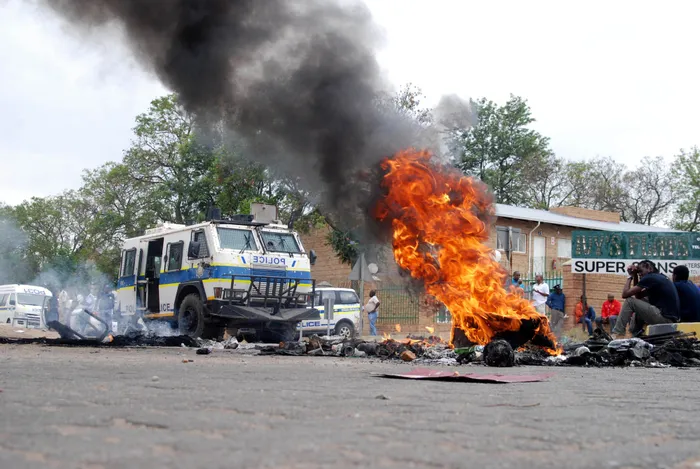There is a service delivery crisis in SA: Bantu Holomisa

Protesters from Ga-Rena government accommodation facility near Polokwane in Limpopo barricade the street with tyres and other objects during a protest against the lack of service delivery, Thursday, 27 November 2014. Picture: SAPA
South Africa has over the past decade faced a plethora of challenges including lack of proper governance and crumbling infrastructure. In a recent report, the Auditor-General (AG), Tsakani Maluleke, raised the alarm about the lack of accountability by government officials, particularly at the country's municipalities where only about 16 percent out of 257 municipalities obtained clean audits.
In our Big Interview, United Democratic Movement leader Bantu Holomisa reflects on service delivery in the country and how the crisis could deepen over the next five years.
How do you think we can fix the country given that some municipalities are on the verge of collapse?
Holomisa: It is unfortunate. It cannot work under the ANC government. The people who have experience, qualifications and good standing in the community have been sidelined by the government of the ANC. Deployment starts from the day they (ANC structures) compile candidate lists. This process is often marred by squabbles and political infighting – who should be elected as councillor and who should be left out. Even now, we have seen how members have been battling it out at ANC conferences.
Last year, I indicated that South Africa needs an interim government to take us to 2024. In other countries, if a party such as the ANC faced scandals with cadres looting, that party would have long resigned as being the government of the day.

The ultimate problem is the cancer of corruption that has infiltrated our state-owned entities. We are experiencing institutionalised corruption at its best. The malfeasance we are witnessing is no new phenomenon. It started many years ago.
Further exacerbating all of these challenges is the fact that crime is rising on a daily basis as the masses attempt to find ways to care for their families. If we are ever to start fixing this country, there need to be funds readily available for continuous development. This development needs to be sustained. There also needs to be a sharp focus on the economy, which is currently in dire straits.
We have got to ensure that the billions attracted from investors at these investment conferences go towards something that is tangible.
Do you think the ANC will agree to an interim government you are proposing?
Holomisa: Not at all. They will never agree on that. But they must suggest ways of how this mess that has been created can be corrected.
Do you think the current crisis around service delivery can be addressed at all?
Holomisa: Yes. First step is political participation. It’s all a matter of all political parties, civil society, traditional leaders and churches reaching out to the masses and educating the electorate about what change their votes can bring.
Are you suggesting there could be changes post the 2024 national elections?
Holomisa: Absolutely. The best option in 2024 is that (the government) should be run through a coalition so that you could have checks and balances. The President could come from the ANC and the Deputy President from the opposition. The portfolio committees in Parliament should be chaired by the opposition, That is what we have been suggesting. The State Capture Commission report by Chief Justice Raymond Zondo should be a living guide for us on what to do and how to go about avoiding the pitfalls that have led us down a murky path as a country. Pitfalls that have put us on the brink of collapse.
*This article was originally published in The African
Related Topics: